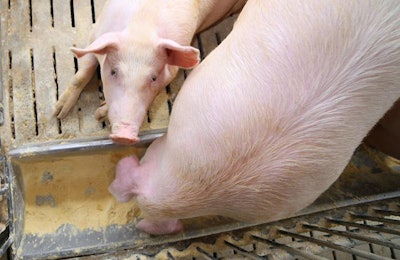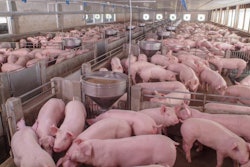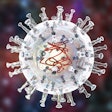
The only European state that officially reported outbreaks of African swine fever in domestic pigs over the past week was Romania. Seven states have officially recorded outbreaks in wild boar.
Romania’s agriculture ministry confirmed a total of 27 outbreaks in domestic pigs to the World Organisation for Animal Health (OIE). All occurred since about the start of December.
In total, more than 2,700 pigs were directly lost to the disease as a result of mortality or culling. One of the outbreaks involved approximately 2,300 pigs at a farm in the central-southern county of Dambovita. Others were in backyard herds across much of the country.
Up to December 15, there have been 1,885 confirmed outbreaks of ASF among domestic pigs in Europe so far in 2019, according to the European Commission (EC).
From this source, by far worst affected has been Romania (1,704 outbreaks). Poland has had 48, Ukraine 42, Bulgaria 41, Lithuania 19, the Republic of Serbia 18 and Slovakia 11. There was one outbreak in Italy as well as one in Latvia earlier in the year. EC figures do not include cases in Moldova or Russia.
More cases in European wild boar
This year, there have been 5,963 confirmed outbreaks of ASF among European wild boar up to December 15, according to the EC.
Poland has reported the most outbreaks (2,251), followed by Hungary (1,474), Romania (643), Belgium (481), Lithuania (453), Latvia (350), Bulgaria (152) and Estonia (77). Other European states reporting outbreaks in wild boar during 2019 — but with fewer than 50 animals affected — are Italy, Slovakia and Ukraine.
Over the past week, seven European states have reported cases of ASF in wild boar to the OIE.
Poland has again reported the most cases — 297 animals — but some date back as far as September 24. All the affected wild boar were found in Warmia-Masuria, Mazovia, Podlaskie, Lublin and Podkarpackie. Many previous cases have been reported in these eastern provinces.
Other recent cases of ASF in wild boar have been confirmed in Romania (81 animals), Bulgaria (73), Hungary (52), Moldova (5) and Russia (4).
The cases in the Republic of Moldova were all found in Falesti. This was the first confirmed occurrence of ASF in this district. It is located in the west of the country and borders Romania.
Belgium extends ASF infection zone
The infected zone has been extended in southern Belgium following the recent discovery of a wild boar carcass near to Assenois, according to Brussels Times.
The federal agriculture ministry informed the OIE that some remains of a wild boar had been found in the Neufchateau region of Luxembourg province. The ASF virus was detected among these remains of the animal, which had died at least three months previously.
As a result of rigorous culling, the authorities believe there are almost no wild boar still alive within the fenced forest area. The last live animal tested positive for the ASF virus in August. Nevertheless, the forestry minister stressed the need to maintain a high level of vigilance in order to eradicate the disease.
Germany maintains high ASF alert level
Germany’s federal agriculture ministry (BMEL) has repeated a call to the individual state secretaries to maintain all possible measures to prevent the spread of ASF to and within Germany. The move was prompted by the discovery of another ASF-infected wild boar near the border in Poland.
At last week’s meeting between the German and Polish authorities, it was agreed that hunting in the border region would only proceed with the minimum disturbance of wild boar. Further details will be discussed at the next meeting in January.
There was also agreement over closer cooperation between the Friedrich Loeffler Institute (Germany’s federal animal health institute), and Poland’s national veterinary institute.
Serbia reports disease situation ‘resolved’
With the most recent cases of ASF confirmed in September, the agriculture ministry in Serbia has declared the disease situation “resolved” to the OIE.
Since the first cases at the end of July, there have been 18 outbreaks of the disease. All were in backyard herds, and the majority were in the Greater Belgrade region.
ASF situation in other regions
There have been no new outbreaks of ASF in South Africa, according to the latest report from the agriculture department to the OIE. Since April, there have been 18 confirmed outbreaks of the disease. The most recent cases were at a farm on November 1. Four other African countries have reported ASF in pigs this year — Ghana, Ivory Coast (Côte d’Ivoire), Kenya and Zimbabwe.
Indonesia is the latest Asian state to confirm the presence of ASF.
View our continuing coverage of the African swine fever outbreak.
















